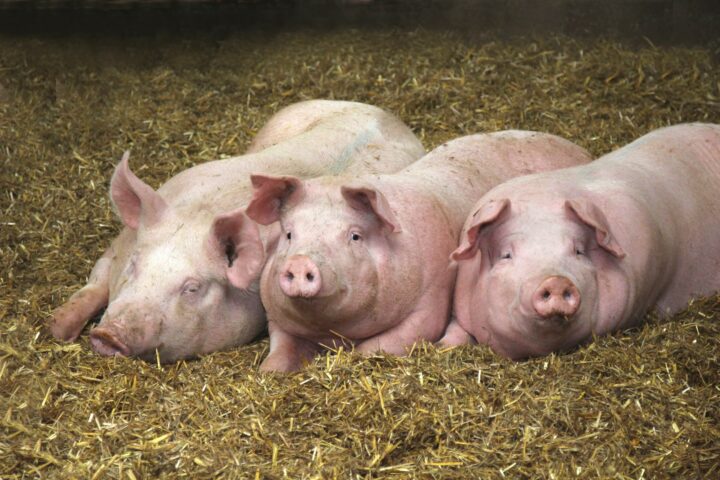
Only half the truth in the genetic engineering debate
Those who only see the risks remain blind to the opportunities offered by a new technology. Opponents of genetic engineering have presented a new survey on new breeding methods, which reveals some telling gaps.
Wednesday, July 16, 2025
The truth is the whole – as German philosopher Georg Wilhelm Friedrich Hegel already knew. Only by considering all aspects of an issue can we get closer to the truth. What sounds trivial is in reality an ambitious undertaking. After all, who can see all the facets of a topic? And yet, if we want to make informed decisions, we have no choice but to follow this principle.
This insight is currently exemplified by the new breeding methods. How should these be assessed? What is the Swiss population's stance on this? These questions are currently also occupying politicians. The Federal Council recently presented a draft law that would allow the use of such techniques, subject to numerous conditions.
In doing so, the government has largely followed the lead of those who are primarily concerned about the risks associated with any new technology. The verdict of experts from the fields of breeding (here is the statement from the association ‘Sorten für Morgen’ (Varieties for Tomorrow)), research (here is the statement from the Academies of Science scnat) and industry (here is the statement from scienceindustries) is correspondingly critical. The NZZ also writes: The bill is less ambitious than the current EU proposal currently being negotiated there. There can hardly be any talk of genuine liberalisation.
Half the truth is not enough
In this context, a new survey by the Sotomo Institute on behalf of circles critical of genetic engineering was recently published. It highlights the Swiss population's attitude towards genome editing – but exclusively from the perspective of potential risks. Respondents were asked about their concerns regarding nature, health, dependence on large distributors and the influence of multinational corporations.
The result: a majority are sceptical. This is hardly surprising – if you only ask about the dangers, you will mainly get fearful answers. What the survey completely ignores are the potential opportunities and concrete benefits of the technology – for example, for environmental protection, agriculture or food security.
The fact that such distortions are not isolated cases is also evident in other policy areas. ETH core researcher Annalisa Manera said in an interview with the SonntagsZeitung: ‘The result depends entirely on how the question is asked. If you just ask, «Do you want a new nuclear power plant?», the majority will be against it – which is understandable, because not everyone wants a new power plant if it is not necessary. If, on the other hand, you ask, “Do you support the construction of new power plants to combat electricity shortages?”, clear majorities will be in favour.’
There is also an interesting contrast in breeding technologies when looking at earlier representative studies from 2021 and 2024 – conducted by the polling institute gfs.bern on behalf of swiss.food.ch. These studies asked about both risks and benefits. The picture was more balanced – and more positive than the Sotomo survey:
- 72% of respondents thought it made sense to use new breeding methods to make plants more climate-resistant.
- 69% were in favour of using fewer pesticides thanks to such methods.
- Around 60% were open to differentiated regulation of new technologies.
Another signal: in the 2021 study, 79% of the population still wanted to extend the moratorium on genetic engineering. In the 2024 survey, this figure has fallen to just 59% – a remarkable decline of 20 percentage points in only three years. This shows that opinions are changing – when the population is informed about all the facts and the specific benefits.
New study confirms this trend
This trend is now also confirmed by a new representative Civey survey conducted in July 2025 on behalf of various associations in the German agricultural and food industry. The results are consistent with the gfs.bern surveys:
- 79.4% of respondents are in favour of precisely optimised plants from new breeding methods not being regulated more strictly than those from conventional mutation breeding.
- When asked about the most important advantages, 41.6% cited reduced use of plant protection products, 33.5% cited climate protection and 23.1% cited secure harvests.
These figures also clearly show that when the benefits and potential are discussed, the population is very open to the idea. The current political debate needs more than just warnings and worst-case scenarios. It needs a broad perspective that highlights the opportunities and potential and puts the technology in the right context. The Bauernzeitung newspaper has done this, for example, by discussing the various surveys in an article and correctly contextualising the current debate on approval: ‘One thing is certain: cisgenic plants have been used in agriculture for decades. However, they were previously produced in a different way.’ Because this is actually the central message: the new breeding methods may be more recent, but products from mutation breeding have been found in our fields and on our plates for decades. This understanding is central to the current discussion and should also lead to more and more people in Switzerland taking a more positive view of the new breeding technologies.
After all, these will be one of the keys to tackling challenges such as climate change, pest pressure and security of supply – provided we take a holistic approach. The truth is not fear. The truth is the whole picture!
Sources
Kindly note:
We, a non-native editorial team value clear and faultless communication. At times we have to prioritize speed over perfection, utilizing tools, that are still learning.
We are deepL sorry for any observed stylistic or spelling errors.
Related articles

Gene Technology Obstacles Result in Lost Lives
The World Health Organization (WHO) believes that a staggering 500,000 children across the globe become blind every year due to a lack of vitamin A.

Genetic engineering? Yes, of course.
As a consumer, you often don't know: products advertised as GMO-free have long contained genetic engineering. This is a thorn in the side of opponents of genetic engineering. But it is easier to keep quiet about the ‘scandal’ – because something we have been eating for a long time no longer scares us.

The opponents of green genetic engineering lack facts. Their anti-attitude is a dangerous ideology
Switzerland and the EU will decide on the cultivation of plants modified using new breeding technologies in 2025. Authorisation is sensible – and long overdue. After all, genetic engineering is already widespread.

Why consumers accept gene-edited foods on their plates
Acceptance of gene-edited foods increases when their tangible benefits are clear to consumers. Studies show that visible advantages for health, the environment or food security are key to public support.

What’s Really in Your Shopping Basket
Genetic engineering in our shopping basket? Yes – and much more often than we think. Whether it’s pasta, bread or vegetables: many of the everyday products we consume come from mutation breeding, which involves altering the genome and is considered safe. It’s high time to debunk the common myths.

Genomic breeding methods are not given a chance to prove themselves
Modern genomic breeding methods are legally classified as genetic engineering – and are therefore still effectively blocked. Yet we have been eating genetically modified plants for decades, just under the label of “classical mutagenesis.” The new, more precise techniques are regulated more strictly than the old ones, even though they are considered safer from a scientific perspective. A contradiction that urgently needs to be corrected. The EU is setting a good example.

No Pig Business: Why Testicle-Free Boars Are a Clear Win for Animal Welfare
New breeding methods are opening up new possibilities in both plant and animal breeding. They allow targeted genetic changes that can make animals more resilient, adaptable, and healthier.

